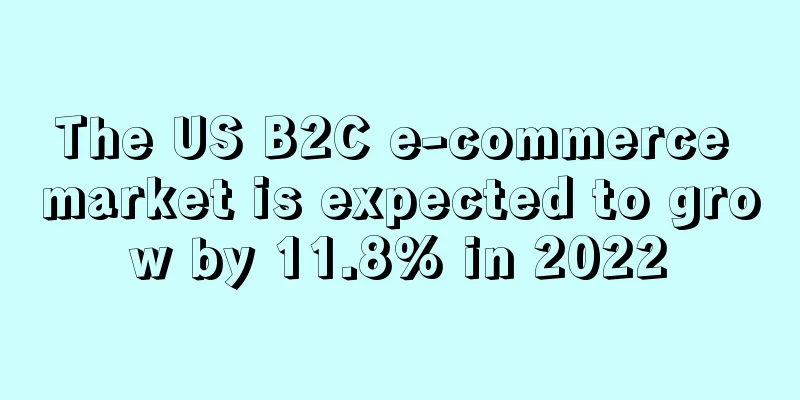The US B2C e-commerce market is expected to grow by 11.8% in 2022

|
According to ResearchAndMarkets.com, the U.S. B2C e-commerce market is expected to grow 11.80% year-over-year to reach $ 1,574.5 billion this year.
Data shows that the US B2C e-commerce market is expected to achieve a compound annual growth rate of 10.22% during 2022-2026 , and is expected to reach US$232.39 billion by 2026 .
Although the growth rate of e-commerce sales in the United States declined in 2021, the overall order volume is still much higher than the pre-COVID-19 level.
The decline in the growth rate of online sales also reflects the trend of consumers returning to physical stores for shopping in 2021. Although physical store sales momentum soared last year, American consumers' enthusiasm for online shopping has not receded at all.
As consumers become more accustomed to the convenience of online shopping, coupled with the increasingly improved services provided by e-commerce platforms, it is expected that the online shopping trend in the United States will be further promoted in the next three to four years.
In addition, in order to enter markets with higher industry barriers, some US e-commerce platforms have decided to directly acquire overseas e-commerce companies.
In June 2021, the US e-commerce giant Etsy announced that it had acquired the Brazilian handicraft e-commerce platform Elo7 for US$217 million. The acquisition is expected to help Etsy gain a foothold in the Latin American market.
In the same year, Etsy also acquired the British clothing shopping brand DePOP for US$1.63 billion. By acquiring DePOP, Etsy will improve the consumer shopping experience, thereby increasing the conversion rate of its business in the UK and achieving further growth. In addition, the acquisition of DePOP will also help attract Generation Z consumers around the world.
On the other hand, virtual world technology has the potential to completely reshape the e-commerce industry. In addition to providing instant gratification, the combination of virtual reality and e-commerce can also greatly influence customers' purchasing decisions and improve customer satisfaction.
Therefore, in order to create a better shopping experience for customers, many leading companies in the e-commerce field have begun to invest and deploy in the field of virtual reality.
In December 2021, Walmart, one of the largest retailers in the United States, applied for several trademarks, hinting at plans to sell virtual goods, including toys, appliances, electronics, clothing, sports equipment, home decoration, etc. In addition, according to Bloomberg, Walmart has also applied for trademarks such as Verse to Curb, Verse to Home, and Verse to Store , which also suggests that the company may be preparing for a virtual reality shopping experience. USA E-commerce B2C |
<<: As the pound plummets, Americans are choosing to travel to the UK
>>: A seller in Shenzhen reported that an employee was investigated for receiving huge kickbacks
Recommend
An anonymous infringement case has surfaced, and some sellers have had their accounts frozen
According to the content of the notice, the accou...
Another Amazon hit is about to be successfully launched!
The 3C consumer electronics business is booming ,...
The epidemic has created new demand, and India's packaged food sales have doubled
Before the outbreak of the epidemic, the mainstre...
What is nanrobot? nanrobot Review, Features
nanrobot is an online store focusing on scooters. ...
FedEx releases new notice! Shipping costs will increase on June 21st
Recently, FedEx Express issued a new notice stati...
What is Dingdian Logistics? Dingdian Logistics Review, Features
Dingdian Freight (Shenzhen Dingdian International...
UAE market demand rebounds, retail sales to reach $58 billion this year
The Dubai Chamber of Commerce and Industry (DCCI)...
Amazon's IPO was suspended again after half-year revenue exceeded 3 billion
As the main force in the cross-border e-commerce ...
Another group of people are changing careers! Where did the resigned operations staff go?
Should we maintain the status quo or leave our co...
By 2026, buy now, pay later will contribute 14% of e-commerce transactions
According to Benori Knowledge research , BNPL has...
What is Detsky Mir? Detsky Mir Review, Features
Detsky Mir is a multi-format digital retail opera...
Amazon will automatically return products to consumers? Sellers start complaining again after the new policy is released...
Yesterday, Amazon US issued an announcement stati...
What is MultiParcels? MultiParcels Review, Features
<span data-docs-delta="[[20,{"gallery"...
Another fashion category is emerging in the United States, and the market size will reach nearly 31 billion US dollars
According to eMarketer, by 2025, sales on U.S. fa...
120,000 people from the Royal Mail in the UK are on strike, and the logistics system may be paralyzed!
According to foreign media reports, 115,000 Royal...









